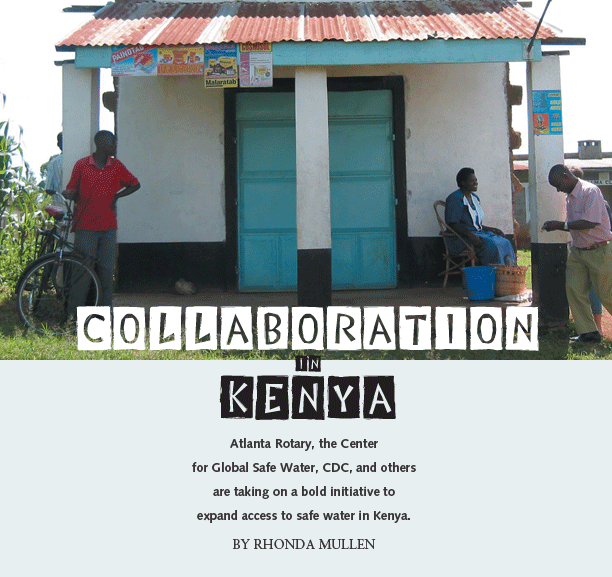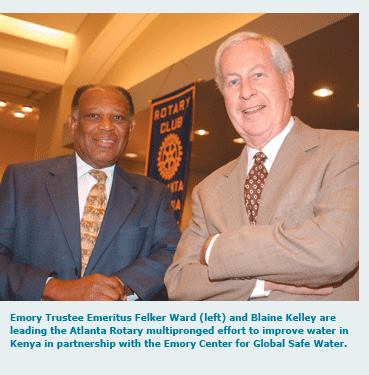








 



|
 |
 |
The
way Blaine Kelley Jr. tells it, he was minding his own business,
enjoying retirement after a long career as a real estate developer,
when the phone rang. The person on the line was Felker W. Ward Jr.,
71L, then president of the Rotary Club of Atlanta, Emory trustee
emeritus, and a winner of the Emory Medal. Ward was calling with
a proposal. In connection with the upcoming centennial in 2005 of
Rotary International, the Atlanta club was looking for a meaningful
service project to take on. Rotary International, which was nearing
the end of a successful vaccination campaign to eradicate polio,
was turning its focus in the centennial year to improving water
quality around the globe. Ward wondered if Kelley would head a committee
to investigate what Rotary Atlanta could do to help. He suggested
Kelley might start looking in Kenya, where there is a large and
active group of Rotarians.
As Kelley explored the water situation
in Kenya, he found that more than half of the 31 million people
there lack access to any kind of safe water, and a severe drought
for the past three years has worsened the problem. Tens of thousands
of Kenyans—many of them children—die each year due to
the lack of safe water. Although many organizations have tried to
help, so far, Kelley discovered, no long-term, sustainable program
has been developed.
Kelley and Ward began making the rounds
of global health experts in Atlanta to get a deeper understanding
of the challenge. They met with John Hardman, executive director
of The Carter Center, which has programs in guinea worm eradication
and trachoma control as well as a global development initiative,
all linked to water quality. Jeffrey Koplan, vice president for
academic health affairs at Emory’s Woodruff Health Sciences
Center and a fellow Rotary member, and Rollins School of Public
Health Dean and Rotarian James Curran shared with Kelley and Ward
the efforts being undertaken by the Center for Global Safe Water
at Emory. That led to connections to CGSW partners, including CDC,
CARE, and Population Services International (PSI). Kelley and Ward
also touched base with Charlie Stokes, director of the CDC Foundation
and another Rotarian, and CDC’s Eric Mintz and Rob Quick,
who have implemented a system for safe water worldwide. (See
related story, Safe Water) |
 |
| |
|
|
|
|
 |

In April 2004, Kelley and Ward traveled to Kenya to see for themselves
the conditions that their new contacts had described. Hosted by
officers of the Kenya Rotary clubs, they first visited the arid
lands around Machakos, some 70 miles east of Nairobi. They met children
of the Masai tribe, many of whom had walked five miles to dip their
gourd into a muddy spring to fill a five-liter container of water.
The children then strapped the heavy jugs onto their backs with
a headband and shoulder band and began the long journey home.
“We were immediately touched
by seeing firsthand what the lack of water does to people,”
says Kelley. “We also saw a brand new well and the good that
it can do.”
The
pair next flew to Kisumu, where CDC supports a staff of 580 working
on a variety of health problems that afflict Africa, including malaria,
HIV, and diarrheal diseases. In this western, tropical region of
Kenya, despite the presence of Lake Victoria and an abundance of
creeks and streams, virtually all the bodies of water are contaminated.
CDC is working with partner organizations in this part of Kenya
to implement the Safe Water System, which consists of water treatment
using a disinfectant solution produced by a local company, safe
water storage using specially designed clay pots made by local women’s
groups, and behavior change communications. CDC and its partners
also distribute a water purification powder called PUR (made by
Procter and Gamble Company) that removes sediment from muddy water
and leaves behind a chlorine residual that kills bacteria.
In a novel approach to reaching the
poorest of the poor, CDC is working with Society for Women and AIDS
in Kenya (SWAK) to set up micro-businesses that sell Safe Water
System components, PUR, bed nets, condoms, and other health interventions.
The women of SWAK purchase the health products at wholesale, which
they then sell to friends and neighbors, earning a small profit
and simultaneously reaching the community through grass roots marketing.
(See related story, Where Health and
the Environment Meet.)
The lack of safe water is compounding
the deaths due to AIDS here in the Nyanza district. “Diarrhea
is the last straw. It is the sickness that kills them,” explains
Kelley.
Surrounded by disadvantaged women
and children orphaned by AIDS, Kelley and Ward watched members of
SWAK enact a skit about water and AIDS, along with songs and dances.
“We saw the courage and the smiles,” Kelley says, “and
we came back determined to do something for these courageous people.”

That something is translating into a commitment by Atlanta Rotary
on three fronts: their goal is to dig 100 wells in the arid Machakos
and Kitui districts of eastern Kenya, to support 1,000 SWAK entrepreneurs
in the Nyanza district of western Kenya, and to provide all of these
settlements with access to safe water storage containers and hygiene
training.
Under the leadership of Atlanta Rotary,
which is providing funding and overall leadership, the Rotary Centennial
Partnership for Safe Water in Kenya is pulling together the efforts
of many. Those include Rotary Club of Atlanta, Rotary Clubs of Kenya,
CDC, and the Center for Global Safe Water.
A CGSW fellow will be responsible
for general oversight, management, and reporting on the ground in
Kenya. CDC is providing technical counseling for the project in
the western district, and the CGSW and CDC together will evaluate
the impact of the Rotary projects on the health of Kenyans. Rotary
Clubs of Kenya are providing onsite coordination, contracting, and
monitoring.
These partners are collaborating further
with two well-established volunteer organizations in Kenya that
will oversee the field management for community mobilization, ground
water surveys, and community training as well as the purchase, installation,
and maintenance of hand-operated pumps at the wells. PSI is providing
the products to be sold and running a social marketing campaign,
and CARE is in charge of the hygiene training. A Kenyan company
is the source of the water disinfection solution. Further help is
coming from USAID and the government of Kenya.
In all, Rotary Club of Atlanta estimates
actual and in-kind costs for the initiative will total more than
$1 million, with approximately $706,000 being raised by the club
itself. It is a challenging overseas effort for one local club,
Kelley says, but its potential rewards are great. “We’ll
get a greater payback for the funds provided,” Kelley says,
“than for anything else I know of in the whole world.”

|
 |
| |
|
|
|
|
|
|



